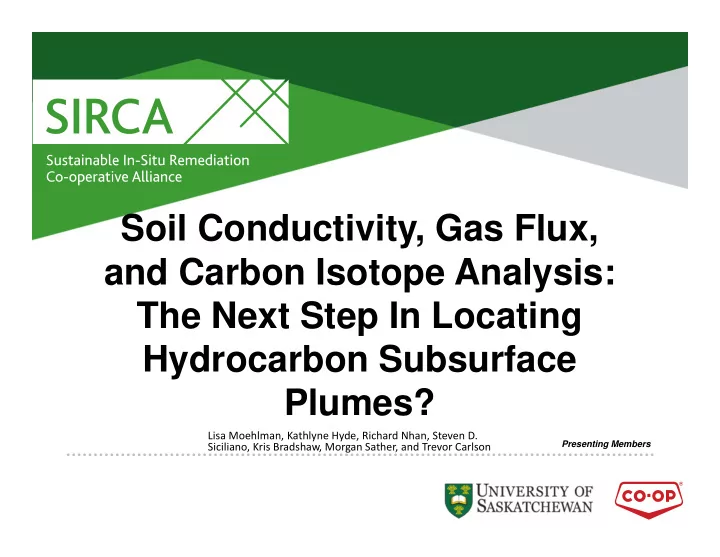

Soil Conductivity, Gas Flux, and Carbon Isotope Analysis: The Next Step In Locating Hydrocarbon Subsurface Plumes? Lisa Moehlman, Kathlyne Hyde, Richard Nhan, Steven D. Presenting Members Siciliano, Kris Bradshaw, Morgan Sather, and Trevor Carlson Integrity Excellence Responsibility
Pre-screening Limited amount and technology for pre-screening Pre-screening can help to: • Improve the quality of site assessment • Locate unknown hot spots • Save time and money
Objective Determine if the combination of • Carbon flux • Carbon isotopes • EM maps can be used as a screening tool
Background CO 2 Flux Electrical magnitude maps +CH 4 +CH 4 Sihota, N.J., K.U Mayer. 2012. Characterizing vadose zone hydrocarbon biodegradation using carbon dioxide effluxes, isotopes and reactive transport modeling. Vadose Zone Journal. Soil Science Society of America. 2.41.
Background δ C 13 Isotope • Microbes prefer C 12 isotope • PHC are high in C 12 -signatures • Increased C 13 -signatures and decreased C 12 -signatures • δ C 13 CO 2 levels: -18 to -24 indicate PHC degradation
Locations Raymore Saskatoon Davidson
Decision units
Methods 1. Soil temperature and moisture 2. Carbon flux readings 3. Gas samples for Isotope analysis 4. EM readings 5. Phase II Assessment
Raymore carbon flux results Circles are CO 2 fluxes Slightly above background (<10 µmol m -2 s -1 ) (no colours indicate at background) Above background (>10 µmol m -2 s -1 ) Well above background (>50 µmol m -2 s -1 ) 7 DU3 DU2 2 4 8 5 1 9a 3 6 9 12 10 11 DU4
Carbon flux and isotope results Elevated CO 2 Respiration Clean Possible Raymore 0 11th W Davidson -5 C CO 2 ( ‰) -10 -15 Hydrocarbon Degradation Confirmed -20 -25 1 10 100 1000 10000 log+1 CO 2 (umol m -2 s -1 ) Fig. δ C 13 of carbon dioxide vs background corrected carbon dioxide flux at Raymore, 11 th &W, and Davidson bulk transfer stations
Electrical magnitude
Check list PHC Remediation CO 2 Flux (µmol m -2 s -1 ) δ C 13 CO 2 (‰) Low EM reading Occurring? Yes Possibly No
Lab analysis
Raymore carbon flux vs. lab results Slightly above background (<10 µmol m -2 s -1 ) Circles are CO 2 fluxes C6-C10 detectable Squares are C6-C10 Above background (>10 µmol m -2 s -1 ) (no colours indicate at background ) C6-C10 > 400 ppm Well above background (>50 µmol m -2 s -1 ) C6-C10 >1000ppm DU3 7 DU2 2 4 8 5 1 9a 3 6 9 12 10 11 DU4
Conclusions Considerations • Heavy clay • Weather permitting • Compacted sites • Contamination depth Industry implications
Acknowledgements Supervisor: Steven Siciliano The Environmental Soil Toxicology Lab group and undergrads Sustainable In-situ Remediation Co-operative Alliance Federated Co-operatives limited
Questions? www.usask.ca
Raymore EM maps 0.5 m (top left), 1 m (top right), and 3 m (bottom center)
Davidson carbon flux vs. lab results Slightly above background (<40 µ mol m ‐ 2 s ‐ 1 ) Circles are CO 2 fluxes C6 ‐ C10 detectable Squares are C6 ‐ C10 Above background (>40 µmol m ‐ 2 s ‐ 1 ) (no colours indicate at background) C6 ‐ C10 > 400 ppm Well above background (>100 µmol m ‐ 2 s ‐ 1 ) C6 ‐ C10 >1000ppm
Davidson EM maps 0.5 m (left) & 1 m (right)
Davidson EM Maps 3 m (left) & 5 m (right)
11 th &W carbon flux vs. lab results Circles are CO 2 fluxes 1 Squares are C6-C10 (no colours indicate at background) 9 2 Slightly above background (<40 µmol m -2 s -1 ) C6-C10 detectable 3 Above background (>40 µmol m -2 s -1 ) 4 7 10 C6-C10 > 400 ppm Well above background (>100 µmol m -2 s -1 ) 5 C6-C10 >1000ppm 8 11 12 6
11 th & W EM maps 0.5 m (left) & 1 m (right)
11 th & W EM maps 3 m (left) & 5 m (right)
Recommend
More recommend